Text
In War and Conflicts Health workers, facilities and supplies are off limits.
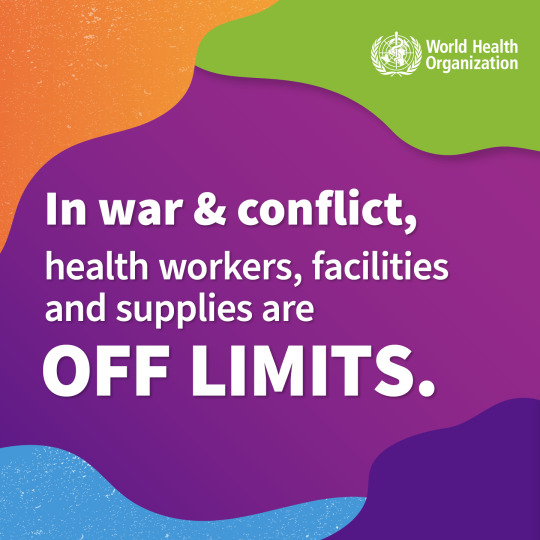

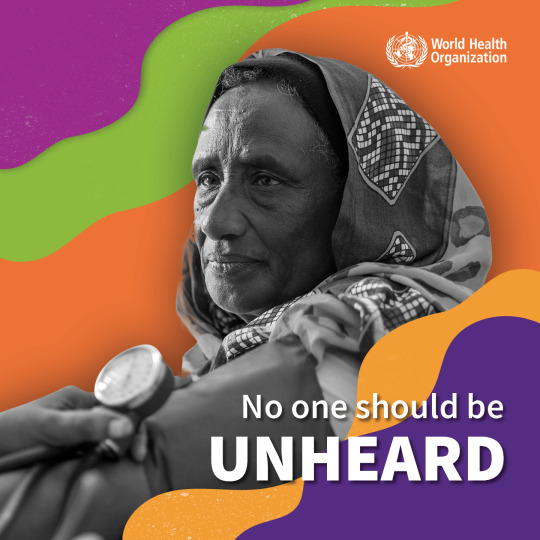

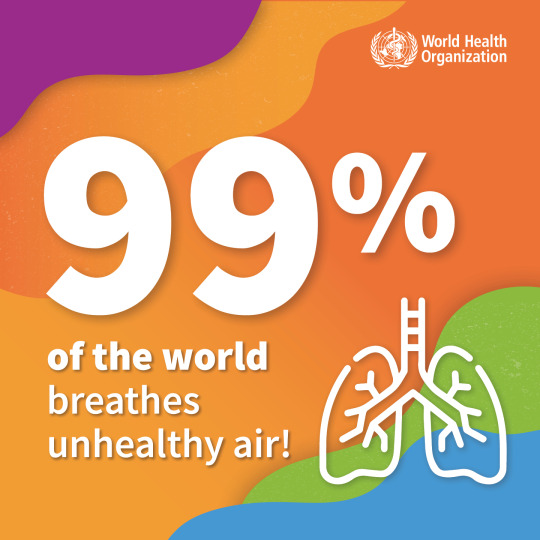



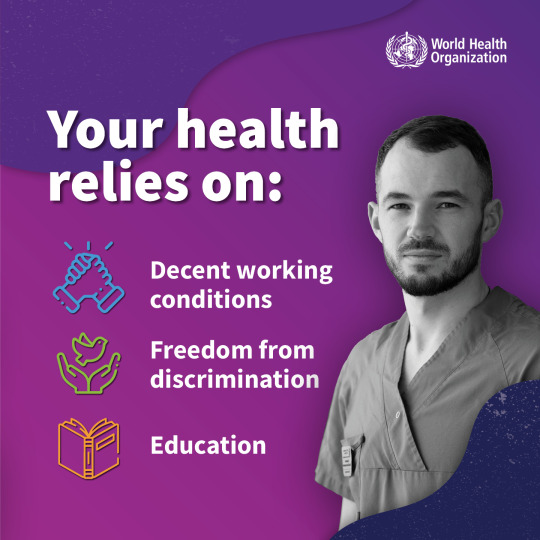
Today there are some 1 billion migrants globally, about 1 in 8 of the global population. These include 281 million international migrants and 82.4 million forcibly displaced (48 million internally displaced, 26.4 million refugees, 4.1 million asylum seekers)(1). UNHCR estimates there are many millions of stateless people globally.
The experience of migration is a key determinant of health and well-being. Refugees and migrants remain among the most vulnerable members of society faced often with xenophobia; discrimination; poor living, housing, and working conditions; and inadequate access to health services, despite frequently occurring physical and mental health problems.
The COVID-19 pandemic has posed additional challenges both in terms of increased risk of infection and death experienced by refugees and migrants and has highlighted existing inequities in access to and utilization of health services. Refugees and migrants have also suffered the negative economic impact of lockdown and travel restrictions.
Refugees and migrants need to be in good health to protect both themselves and host populations. They have the human right to health, and countries have an obligation to provide refugee and migrant sensitive health care services.
In 2020 WHO established the Health and Migration Programme (PHM) to provide global leadership in health and migration issues in the context of WHO’s own Global action plan: promoting the health of refugees and migrants 2019–23.
#right to safe working environment#prohibit discrimination#decent working conditions#right to education#right to shelter#right to healthcare#right to water#right to life#air quotes#worldhealthday#my health my right#right to air quality#conflict settings#humanitarian settings#war settings#refugees health#Health and Migration
0 notes
Text
People living with disabilities have the right to ...
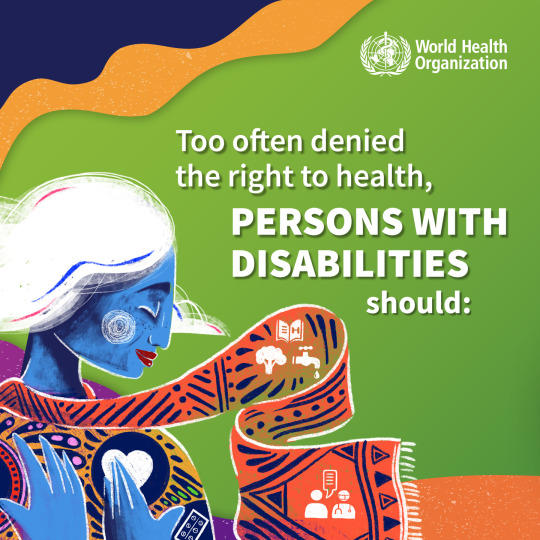



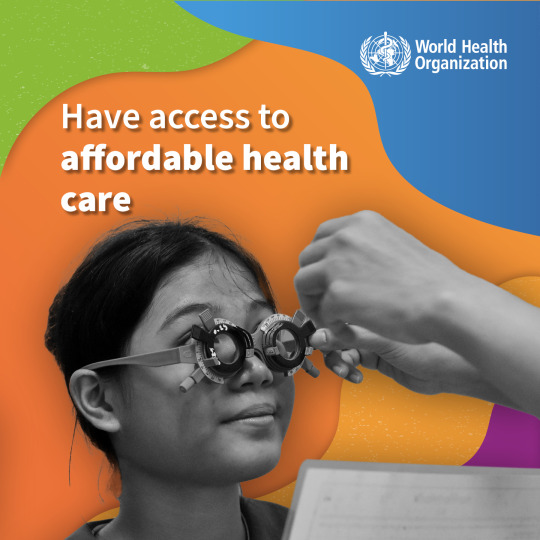
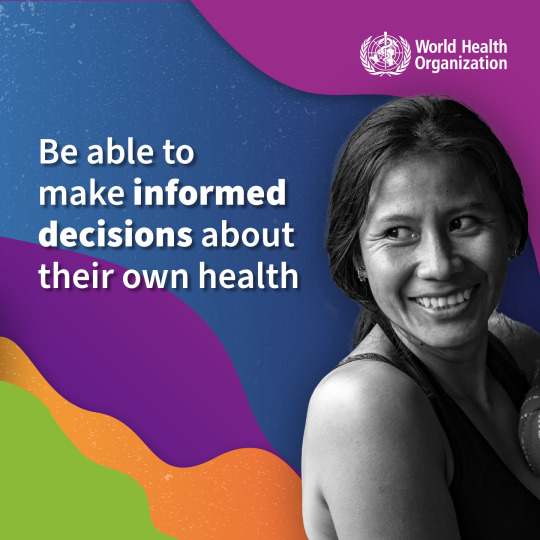
Article 25 – Health
States Parties recognize that persons with disabilities have the right to the enjoyment of the highest attainable standard of health without discrimination on the basis of disability. States Parties shall take all appropriate measures to ensure access for persons with disabilities to health services that are gender-sensitive, including health-related rehabilitation. In particular, States Parties shall:
a) Provide persons with disabilities with the same range, quality and standard of free or affordable health care and programmes as provided to other persons, including in the area of sexual and reproductive health and population-based public health programmes;
b) Provide those health services needed by persons with disabilities specifically because of their disabilities, including early identification and intervention as appropriate, and services designed to minimize and prevent further disabilities, including among children and older persons;
c) Provide these health services as close as possible to people’s own communities, including in rural areas;
d) Require health professionals to provide care of the same quality to persons with disabilities as to others, including on the basis of free and informed consent by, inter alia, raising awareness of the human rights, dignity, autonomy and needs of persons with disabilities through training and the promulgation of ethical standards for public and private health care;
e) Prohibit discrimination against persons with disabilities in the provision of health insurance, and life insurance where such insurance is permitted by national law, which shall be provided in a fair and reasonable manner;
f) Prevent discriminatory denial of health care or health services or food and fluids on the basis of disability.
The WHO QualityRights tool kit provides countries with practical information and tools for assessing and improving quality and human rights standards in mental health and social care facilities. The tool kit is based on the United Nations Convention on the Rights of Persons with Disabilities. It provides practical guidance on:
the human rights and quality standards that should be respected, protected and fulfilled in both inpatient and outpatient mental health and social care facilities;
preparing for and conducting a comprehensive assessment of facilities; and
reporting findings and making appropriate recommendations on the basis of the assessment.
The tool kit is designed for use in low-, middle- and high-income countries. It can be used by many different stakeholders, including dedicated assessment committees, nongovernmental organizations, national human rights institutions, national health or mental health commissions, health service accreditation bodies and national mechanisms established under international treaties to monitor implementation of human rights standards and others with an interest in promoting the rights of people with disabilities.
The WHO QualityRights tool kit is an essential resource, not only for putting an end to past neglect and abuses but also for ensuring high-quality services in the future.
English
Assessment toolkit overview document
Interview Tool
Review of documents & Observation Tool
Facility-based Assessment Report
Country-wide Assessment Report
Arabic
Assessment toolkit overview document
Interview Tool
Review of documents & Observation Tool
Facility-based Assessment Report
Country-wide Assessment Report
Chinese
世界卫生组织有质量的权利工具包
访谈工具
文件审查与观察工具
基于机构的评估报告
国家范围内的评估报告
French
Évaluer et améliorer la qualité et les droits de l’homme dans des structures de santé mentale et de soins sociaux
Guide d'entretien
Guide pour la collecte des données et l'observation
Rapport d'évaluation d'une structure
Rapport pour une évaluation nationale
Portuguese
Direito é Qualidade_Roteiro de Implantação
Ferramenta de análise de documentos e observação
Ferramenta de Entrevista
Relatório de Avaliação por serviço
Relatório de Avaliação a nível nacional
Spanish
Salud mental: Instrumento de Calidad y Derechos de la OMS
Herramienta de entrevista
Herramienta de revisión de documentos y observación
Informe de evaluación de un establecimiento
Informe de evaluación a nivel de país
#persons with disabilities#raising awareness of the human rights#dignity#autonomy and needs#training#needs of persons with disabilities#promulgation of ethical standards#public and private health care#Prohibit discrimination#discriminatory denial of health care#discriminatory denial of health services#7 april#disabilties#world health organization (who)#worldhealthday#right to life#right to heath#right to healthcare
0 notes
Text
Everyone, Everywhere has the right to health
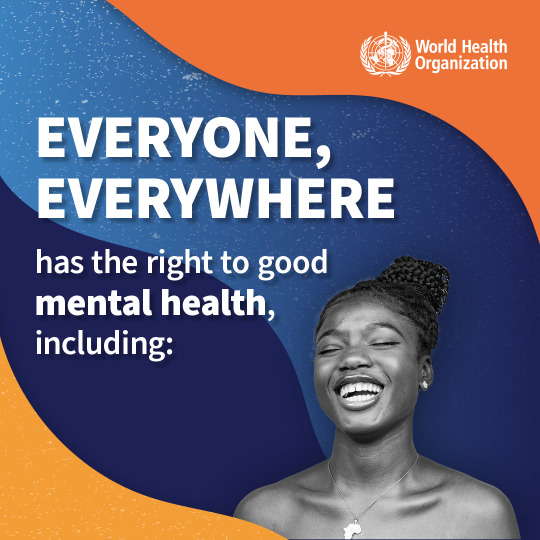
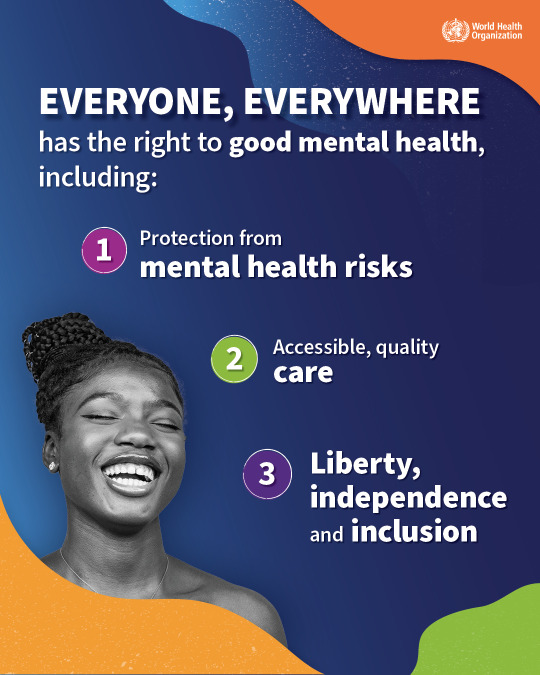
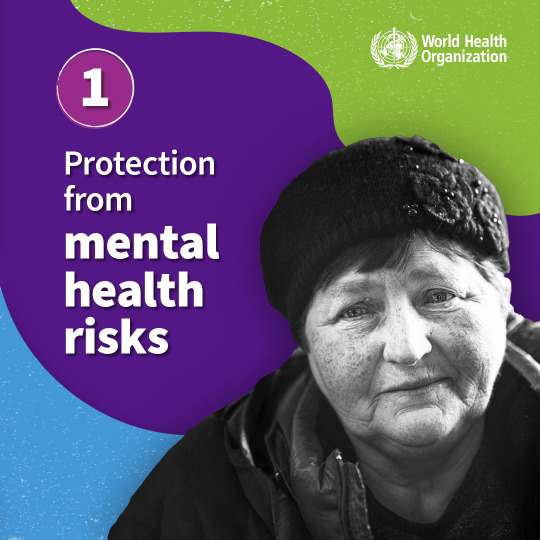


Human rights are enshrined in human rights instruments. All WHO Member States have ratified at least one international human rights treaty that includes the right to the highest attainable standard of health. After ratifying a treaty, a country has a legal obligation to protect and fulfil the rights recognized in the treaty. To deliver on binding human rights commitments countries need to adopt a human rights-based approach to health.
Health and human rights
The right to the highest attainable standard of physical and mental health is enshrined in several international legal instruments including the International Covenant on Economic, Social and Cultural Rights. It includes freedoms and entitlements. Freedoms include the right to control one’s health and body (for example, sexual and reproductive rights) and to be free from interference (for example, free from torture and non-consensual medical treatment and experimentation, particularly relevant for persons with disabilities). Entitlements include the right to access quality health services without any discrimination.
A human rights-based approach to health commits countries to develop rights-compliant, effective, gender transformative, integrated, accountable health systems and implement other public health measures that improve the underlying determinants of health, like access to water and sanitation.
This means countries must ensure legislation and health policies and programmes respect and advance the realization of human rights. Research shows that proactive measures to comply with human rights obligations help countries improve substantive equality and build resilience to shocks. For example, applying a human rights framework to reproductive health can help us identify how preventable maternal mortality and morbidity results from a variety of human rights violations including discrimination and lack of access to quality health services.
Fundamental human rights principles
A human rights-based approach (HRBA) requires mainstreaming fundamental human rights principles and standards across health services and health system policies, including public health emergency preparation and responses. They include:
Non-discrimination and equality: This requires prioritizing the needs of those furthest behind to achieve equity. Equity is used as a framework in public health to identify and address unfair and
remediable health disparities among different sub-populations. HRBA provides legal standards and obligations to put legal protections for equality and non-discrimination into action.
Addressing discrimination requires attention to overlapping and intersecting factors of discrimination notably gender, race, ethnicity, disability, sexual orientation, gender identity and socioeconomic status. An intersectional lens allows for the examination of health inequalities driven by multiple grounds of exclusion and for health interventions to be designed in a way that responds to intersecting factors. This would include, for example, ensuring that health information is provided in formats that allow people to access the information they need.
Participation: Participation requires empowering health service users, communities and civil society to engage in planning, decision-making and implementation processes for health across the programme cycle and at all levels of the system. To be meaningful, participation must include explicit strategies to address power imbalances, value experiential evidence, and manage conflicts of interest so that the needs and expectations of people are met. Participatory planning techniques can be used to engage beneficiary populations in designing health services or public spending prioritization.
Accountability: Countries must establish accessible and effective accountability mechanisms. These may include administrative and judicial remedies and oversight by other institutions, such as national human rights institutions and health and social care regulators. The United Nations human rights mechanisms, including the Committee on Economic Social and Cultural Rights, play a crucial accountability role by regularly reviewing countries’ compliance with their health-related human rights obligations.
There is a growing recognition of the importance of regulation of non-State actors, such as the private sector and non-governmental organizations, to ensure they respect and protect human rights. For example, by enacting bans on tobacco advertising, promotion and sponsorship (TAPS), countries are implementing their commitments to manage tobacco control under the WHO Framework Convention on Tobacco Control. One third of countries (66), representing a quarter of the world’s population, have completely banned all forms of TAPS.
Progressive realization and international cooperation
Some human rights obligations are of immediate effect, such as the guarantee of non-discrimination. Other components of the right to health, like access to cutting edge health technology, are subject to the principle of progressive realization. Countries are legally obliged to use the maximum available resources to develop and implement rights-based legislation, policies and programmes. Countries in a position to assist have an obligation to cooperate with those with fewer resources.
Core components of the right to health
The right to health includes 4 essential, interrelated elements: availability, accessibility, acceptability and quality.
Availability refers to the need for a sufficient quantity of functioning health facilities, goods and services for all. Availability can be measured through the analysis of disaggregated data to different stratifiers including by age, sex, location and socio-economic status and qualitative surveys to understand coverage gaps.
Accessibility requires that health facilities, goods, and services must be accessible to everyone. Accessibility has four dimensions: non-discrimination, physical accessibility, economic accessibility (affordability) and information accessibility. This is particularly important for persons with disabilities who often encounter significant barriers to health related to the inaccessibility of services, facilities and health information.
Assessing accessibility requires analysis of physical, geographical, financial and other barriers to health systems and services, and how they may affect people who are marginalized. It requires the establishment or application of clear norms and standards in both law and policy to address these barriers.
Acceptability relates to respect for medical ethics, culturally appropriate, and sensitivity to gender. Acceptability requires that health facilities, goods, services and programmes are people-centred and cater to the specific needs of diverse population groups and in accordance with international standards of medical ethics for confidentiality and informed consent.
Quality extends to the underlying determinants of health, for example safe and potable water and sanitation as well as requiring that health facilities, goods, and services are scientifically and medically approved.
Quality is a key component of universal health coverage (UHC). Quality health services should be:
safe: avoiding injuries to people for whom the care is intended;
effective: providing evidence-based services to those who need them;
people-centred: providing care that responds to individual needs;
timely: reducing waiting times and harmful delays;
equitable: providing care that does not vary in quality on account of age, gender, ethnicity, disability, geographic location, and socio-economic status;
integrated: providing a full range of health services throughout the life course; and
efficient: maximizing the benefit of available resources and avoiding waste.
Human rights treaties which include the right to health
International Covenant on Economic, Social and Cultural Rights (Article 12)
Elimination of All Forms of Racial Discrimination (Article 5(e) iv)
International Convention on the Elimination of All
Forms of Discrimination Against Women (Articles 11(1) (f), 12 and 14(2)(b))
Convention on the Rights of the Child (Article 24)
International Convention on the Protection of the Rights of All Migrant Workers and Members of Their Families (Articles 28, 43 (e) and 45 (c)
Convention on the Rights of Persons with Disabilities (Article 25)
WHO response
WHO supports countries to deliver on their human rights commitment to ensure non-discriminatory access to effective, quality health services and the underlying determinants of health. To achieve this goal WHO:
advocates for the right to health and other health-related human rights, including through communication campaigns;
raises awareness of health-related human rights, for example on the right to safe healthcare;
supports countries to integrate human rights standards into laws, health programmes and policies, for example through development of tools and guidelines such as guidance on human rights in the context of mental health and sexual or reproductive health;
builds capacity on a rights-based approach to health among policymakers;
provides evidence, analysis and recommendations related to health and human rights; and
collaborates with other UN entities, to ensure human rights are recognized as a fundamental foundation to effective health service delivery, for example through implementation of the United Nations Disability Inclusion Strategy across all 3 levels of WHO.
#independence & inclusion#accessible quality care#mental health risks#right to good mental health#world health organization (who)#7 april#my health my right#worldhealthday#right to life#right to heath#right to healthcare
0 notes
Text
People living with HIV have the right to...

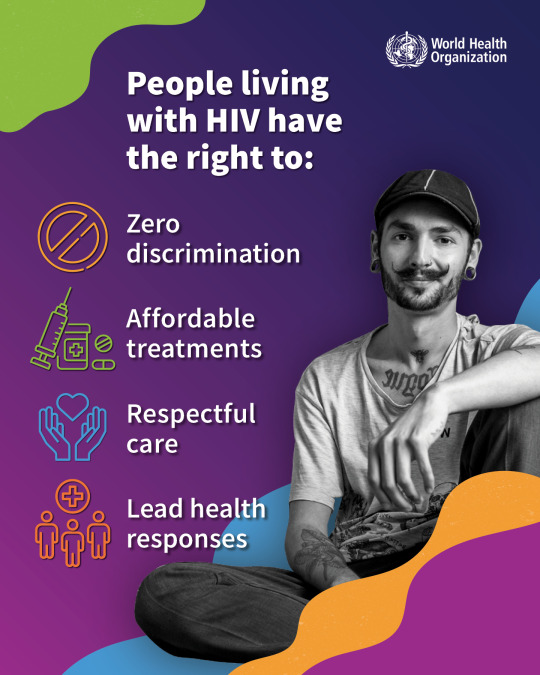

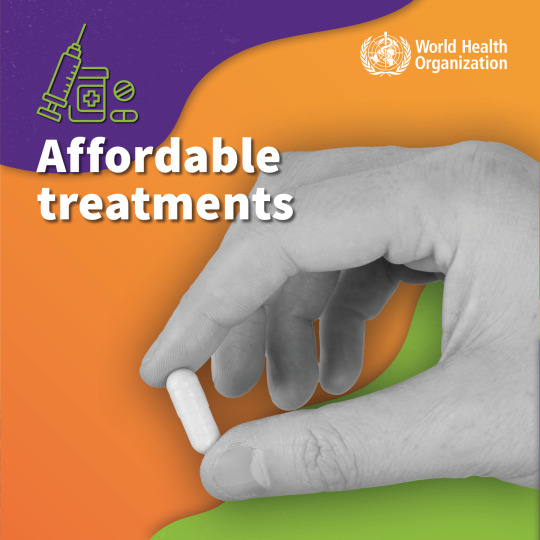

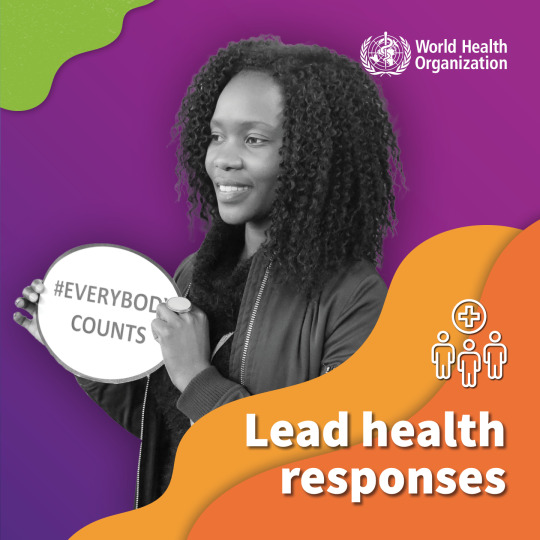
“Everybody has the right to work, marry and have children, travel, to have shelter, to live in safety and in health” says Dr Hussein A. Gezairy, WHO Regional Director for the Eastern Mediterranean. “Sadly, for people living with HIV this is often not the case. Too often they find themselves denied their rights and marginalized. The truth is that many of our societies have failed to address such breaches of the rights of people living with HIV. Every day we hear stories from around the world where HIV infection is the only reason given for denying them their rights.”
Another basic human right is the right to treatment. This means comprehensive treatment, care and support, including access to antiretroviral therapy and other medicines, diagnostics and treatment for related opportunistic infections, the availability of good nutrition, and the provision of social, moral and psychological support. As stated in Article 25(1) of the Universal Declaration on Human Rights: “everyone has the right to a standard of living adequate for the health and well-being of himself, and of his family, including food, clothing, housing and medical care and necessary social services.”
Like all human beings, people living with HIVhave the right to marry and have children. They should have access to counselling, to know that there are medicines that women living with HIV can take during pregnancy to prevent their children from contracting the infection. Health and legal systems must recognize the right of people living with HIV to have children, as stated in Article 16(1) of the Universal Declaration on Human Rights: “everyone has the right to marry and found a family.”
#lead health responses#worldhealthday#world health organization (who)#respectful care#affordable treatment#zero discrimination day#people with living with HIV#hiv prevention
0 notes
Text
Five things that promote the health rights of women and girls.

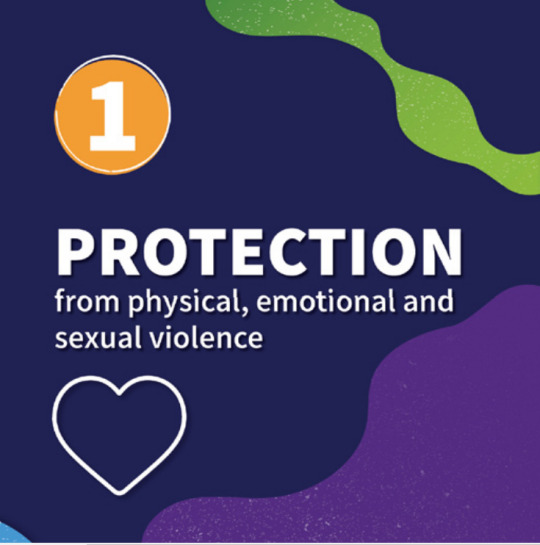
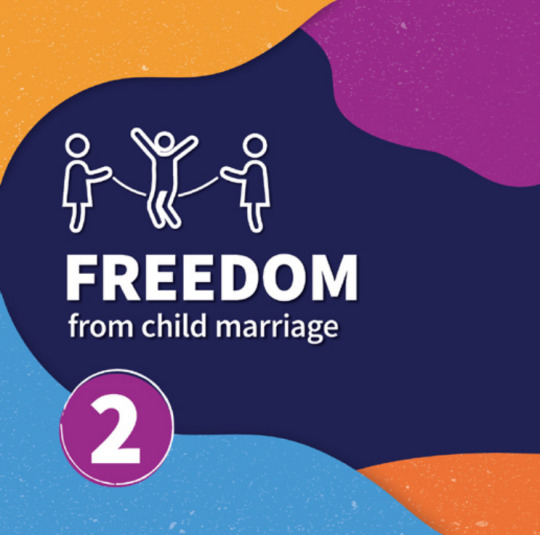



Know your health rights.
#protection#Proper care#freedom#healthcare#safe & respectul#worldhealthday#7april#world health organization western pacific region#my health my right
0 notes
Text
Five key health rights for women and girls.



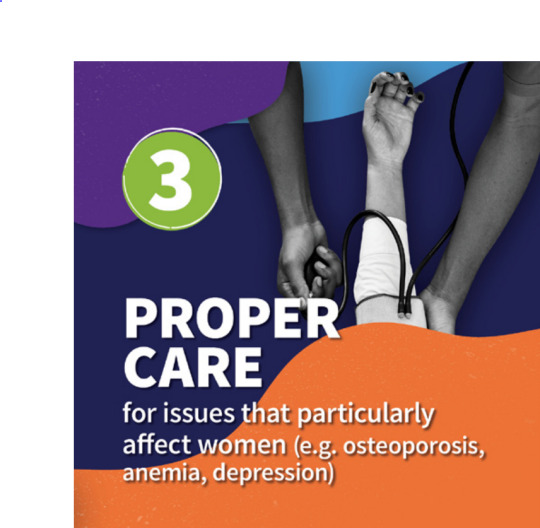
Promote the right to health as an intrinsic pillar of our broader human rights.
#Protection#worldhealthday#right to health#my health my right#world health organization western pacific region#Proper care#freedom#women and girls#issues affecting women
0 notes
Text
Marking the anniversary of the founding of the World Heath Organization (WHO).

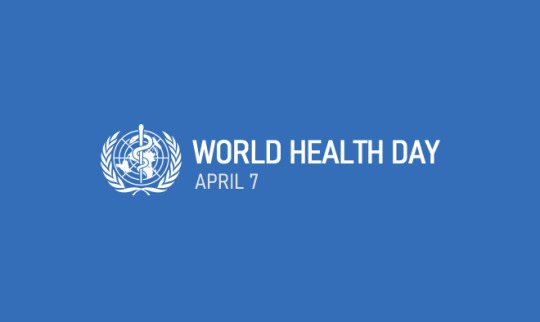
Call for action to uphold right to health amidst inaction, injustice and crises
#worldhealthday#future of health#right to health#world health organization western pacific region#world health organization (who)#paho#world health organization African region#world health organization eastern mediteranean region#world health organization european region#founding anniversary#7april#75 years of improving public health#who’s 75th anniversary#uphold right to health
0 notes
Text
Statement by the Executive Secretary of the Convention on Biological Diversity, on the occasion of the World Health Day 2024; April 7th.
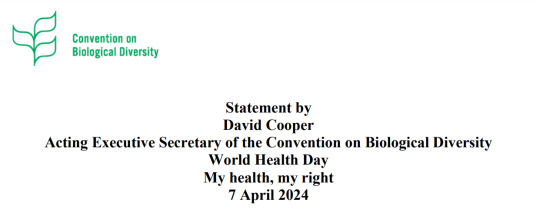
As declared by the United Nations General Assembly in July of 2022, all people have the right to a clean, healthy and sustainable environment. The fulfillment of this right is necessary for the full enjoyment of a wide range of human rights, including the rights to health, food, and water. And it requires that we protect nature. Our health depends on nature, or biodiversity, in so many ways. The variety of plants, animals and microorganisms provides us with essential medicines and nutritious food. Wetlands, forests, and other
ecosystems regulate the climate and protect the supply and quality of water. Urban green and blue spaces support our physical and mental health. But we are losing biodiversity faster than ever before. This loss threatens the multiple contributions of nature to our health. It increases the risk of disease, including pandemics, and our exposure air and water pollution and to extreme events. Children, women, and the elderly are especially vulnerable. Biodiversity loss also has severe adverse impacts on the health of indigenous peoples and their unique interdependent relationship with local ecosystems, impacting physical, mental, emotional, and spiritual health. The Kunming-Montreal Global Biodiversity Framework (the Biodiversity Plan) was agreed by all countries to halt and reverse the loss of biodiversity by 2030. Its four goals aim to protect and restore
nature, to prosper with nature, to share benefits fairly, and to invest and collaborate for nature. This Biodiversity Plan is underpinned by a human rights approach, and it recognizes that the health of humans, animals and plants, wild and domestic, and the integrity of ecosystems are all linked and interdependent. Achieving the goals and targets of the Plan is essential to realize our right to health. We must all be part of the Plan.
This World Health Day, as we promote “My health, my right”, lets us all be part of the Plan. Let us redouble our efforts to protect life on earth. Our health and that of future generations depends on it.
Mr.David Cooper, CBD Executive Secretary.
#righttosafeenvironment#right to life#right to health#my health my right#world health day#Convention on Biological Diversity (CDB)
0 notes
Text
Statement from the Blinded Federation of America on behalf the observance of World Health Day 2024.

This Sunday, April 7th, is World Health Day, celebrated annually as a global health awareness opportunity under the sponsorship of the World Health Organization (WHO). Like VA’s monthly Whole Health themes promoted regularly in BVA Happenings, World Health Day draws attention to a specific health topic of concern to people throughout the world each year. This year’s theme is “My Health, My Right.” The origin of the choice of dates stems from the founding of WHO on April 7, 1948.
WHO asserts that the right to health is increasingly coming under threat due to disease, natural disasters, and international conflicts. The WHO Council on the Economics of Health for All has found that although at least 140 countries recognize health as a human right in their constitutions, they are not passing or enforcing laws to ensure that their populations can or will access health services.
WHO selected this year’s theme to champion the right of everyone, everywhere to have access to quality health services, education, and information, as well as safe drinking water, clean air, good nutrition, quality housing, decent working environmental conditions, and freedom from discrimination.
For more about WHO’s objectives for this year’s World Health Day as well as past themes, click here.
#a reality for all#worldhealthday#right to heath#right to water#right to foof#right to shelter#right to safe working environment#right to expression#right to quality health service#right to breathe clean air#right to life#right to access quality healthcare
0 notes
Text
Focusing on the right of everyone to have access to quality health services requires substantial investment

The International Council of Nurses (ICN) has welcomed the World Health Organization’s World Health Day theme My Health, My Right, ahead of World Health Day, Sunday, April 7th.
The World Health Organization (WHO) says at least 140 countries recognize health as a human right in their constitutions, but more than 4.5 billion people were not fully covered by essential health services in 2021, a situation since made worse by the effects of the global pandemic.
ICN President Dr Pamela Cipriano who is part of the UHC2030 Taskforce said: “ICN supports the work of WHO and the campaign to achieve UHC. Unfortunately, collectively the member states of WHO have not invested sufficiently to bring about the changes that are so desperately needed to make UHC a reality."
‘Nurses hold the key to many of the health care burdens that are affecting communities around the world. They keep people healthy, support them to recover from health conditions and live full and independent lives, but nurses’ commitment and professionalism are being undermined by lack of investment and the current nursing shortages which ICN estimates to be at least 13 million. Without substantial investment from governments, the ambition of UHC will never be met but with the right political will it is possible, and the call for this year’s World Health Day – the right of everyone to have access to quality health services – can become a reality.
Clearly without a strong and well-funded nursing workforce access to quality health services is limited. As our partner project with BBC StoryWorks, Caring with Courage, demonstrated, nurses play a key and fundamental role around the world in being the providers and conduits of health care. Without nurses, health as a human right is merely a pipe dream.”
#lack of investment#access to quality essential services#worldhealthday#7april#nursing#substantial investment#International Council of nurses#achieve UHC#health conditions#my health my right#right to heath#right to quality health service#care services#make UHC a reality#universal health coverage#right political will#care professionals#care provider#Caring with Courage#right of everyone to have#nurses' commitment#nurses' professionalism#essential health services#nursing shortages
0 notes
Text
Guarantee that everyone can access quality healthcare services without experiencing financial hardship.
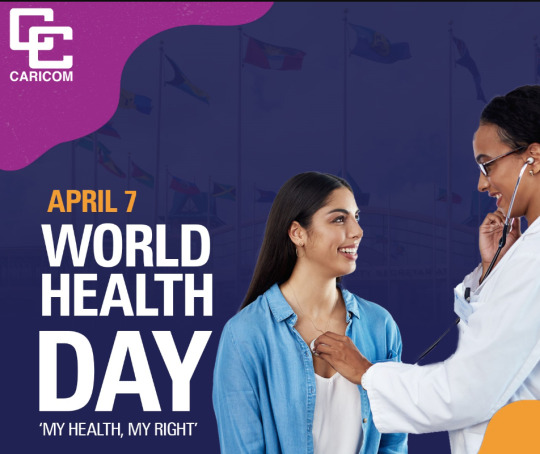
On April 7th, the world celebrates World Health Day to raise awareness and encourage action on global health issues. The theme for this year’s commemoration, “My Health, My Right”, emphasises the importance of affordable, accessible, and high-quality healthcare services for all, including addressing inequalities and investing in resilient health systems for CARICOM Member States. By investing in these health systems, CARICOM Member States can guarantee that everyone can access quality healthcare services without experiencing financial hardship.
“My Health, My Right” is also a powerful reminder of the pivotal role of individual empowerment in achieving better healthcare outcomes. It asserts that every person has the fundamental right to make informed decisions, access quality care, and lead a healthy life. This call to action, urging individuals to advocate for themselves and demand meaningful change from their governments and healthcare systems, is potent. Let us seize this moment to reflect on the importance of our health and take decisive action to secure our fundamental right to good health. We can all make a difference. By prioritizing our health, we can contribute to a healthier, more resilient world.
0 notes
Text
Statement from the Ministry of Health and the Government of Uganda, on World Health Day 2024.
On behalf of the Ministry of Health and the Government of Uganda, I take this opportunity to welcome you all to this press briefing, convened in commemoration of World Health Day.
World Health Day is celebrated every 7th April, to focus on issues of global concern as a means of promoting health.

0 notes
Text
Statement by the PAHO Director on World Heath Day 2024; April 7th.
The PAHO Director emphasized that the Organization co
ntinues to make progress in the implementation of its initiative to eliminate more than 30 infectious diseases and to promote actions against non-communicable diseases, such as cancer and diabetes. He also emphasized PAHO's work to strengthen the region's health services by introducing innovations and technologies to enable them to respond more effectively and equitably to health threats.
“Health and well-being are central aspects of living a full life and should not be regarded as a privilege, but rather viewed as the foundation from which society develops, grows, and prospers,” the PAHO Director said.

#mi salud mi derecho#dia mundial de la salud#WHO/PAHO#Statements#mensagem#pan american health organization
1 note
·
View note
Text
PAHO have reiterated its commitment to the right to health for all people, without discrimination of any kind.

For World Health Day, celebrated on April 7, the Pan American Health Organization (PAHO) reiterated its commitment to the right to health for all people, without discrimination of any kind.
"At PAHO, we strive to fulfill this right to health by working with our Member States to advance universal health for all, including for those populations living in situations of vulnerability,” PAHO Director, Dr. Jarbas Barbosa, said.
The theme of the World Health Day 2024 is "My health, my right,"and seeks to promote the right of all people, everywhere, to access to quality health services, education and information, as well as to safe drinking water and sanitation, clean air, good nutrition, quality housing, decent environmental and working conditions, adequate social protection and freedom from discrimination, among others.
In 1948, the World Health Organization (WHO) recognized health as a human right in its Constitution. However, in the Americas, almost 30% of the population has unmet health care needs, a situation that is exacerbated in low-income countries and in the most impoverished and vulnerable communities.
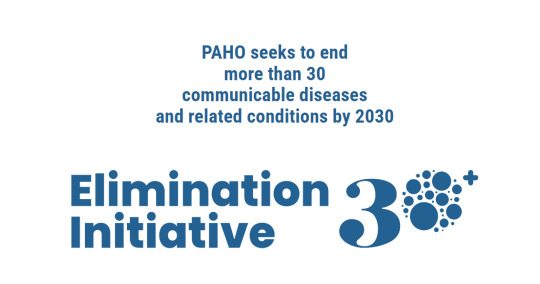
To ensure the right to health, Dr. Barbosa stressed the importance of addressing the historical inequalities that prevent many from exercising this right, which were exacerbated by the COVID-19 pandemic. "Socioeconomic conditions such as poverty and limited access to basic services expose people to a higher risk of disease,” he said. “Financial, geographic and cultural barriers also hinder access to care for some populations.”
PAHO recommends transforming health systems based on primary health care (PHC), a model centered on people and communities, which focuses on health, not disease. It also calls for addressing the social and environmental determinants that condition the health, well-being and health equity of individuals and communities through intersectoral action.
Other recommendations to ensure equitable access to services include increasing investment in health to at least 6% of GDP, investing 30% of these resources in the first level of care, and eliminating direct payments at the point of care.
The PAHO Director emphasized that the Organization continues to make progress in the implementation of its initiative to eliminate more than 30 infectious diseases and to promote actions against non-communicable diseases, such as cancer and diabetes. He also emphasized PAHO's work to strengthen the region's health services by introducing innovations and technologies to enable them to respond more effectively and equitably to health threats.
“Health and well-being are central aspects of living a full life and should not be regarded as a privilege, but rather viewed as the foundation from which society develops, grows, and prospers,” the PAHO Director said.
#transforming health systems#primary health care#pan american health organization#PAHO#WHO/PAHO#worldhealthday#my health my right#7 april#Health and well-being#right to health#americas
0 notes
Text
Statement from UNFPA Executive Director Dr. Natalia Kanem on World Health Day 2024.

End discrimination to ensure the right to health for all
On World Health Day, we celebrate the successes achieved since the adoption of the 1994 International Conference on Population and Development (ICPD) Programme of Action in Cairo, which placed sexual and reproductive health and rights at the heart of development.
Since Cairo, more women enjoy the right to health and are able to exert agency over their own bodies and fertility. More women have access to modern contraception, fewer women are dying in pregnancy and childbirth, and teen pregnancy rates have fallen.
Still, too many women and girls have been left out of that progress. Even as we accelerate efforts to fulfil the promise of the ICPD and the Sustainable Development Goals, healthier lives remain out of reach for far too many people, especially those from underserved communities.
Although the global average maternal mortality rate has declined significantly in the past three decades, a woman still dies every two minutes due to preventable pregnancy- and childbirth-related complications. Deaths occur at much higher rates in poorer countries: the lifetime risk of maternal death is 1 in 49 in low-income countries, compared to 1 in 5,300 in high-income countries.
Discrimination in all its forms contributes to poor maternal health outcomes. Even in better-off countries, maternal death rates are higher among communities that continue to confront racial and other prejudices in everyday life. UNFPA research finds women of African descent in the Americas are more vulnerable to mistreatment and neglect by health-care providers.
We can and must do better. It’s time to end the discrimination and exclusion that women, in all of their diversities, continue to experience when they seek sexual and reproductive health care.
Justice and equality will only be possible when our healthcare systems provide everyone with access to the respectful, compassionate and quality care they deserve.
Today and every day, let us uphold the right of all people to reach the highest possible standard of health, free from discrimination, coercion and violence. Let us champion sexual and reproductive health and rights for all as the path to a sustainable future where everyone can realize their potential.
0 notes
Text
Statement by European Commissioner; Mr. Kyriakides on behalf the World Health Day 2024.

“The theme for World Health Day 2024 is ¨My Health My Right”, emphasising that access to quality health care is a fundamental right.
This is the core principle that has shaped the strong European Health Union we have been building since 2020.
Over the past years, the COVID-19 pandemic irreversibly changed the world, testing our societies, our health systems, and our Union, to the limit. The EU as a whole rose to the challenge and built on this experience to emerge stronger as a Union.
Our response to the pandemic showed the power of solidarity and cooperation and the importance of delivering for all citizens, equally. The unprecedented EU Vaccine Strategy ensured that all EU citizens had access to safe and effective vaccines at the same time under the same conditions.
We saw that for a safer, healthier future for every EU citizen, we need stronger, more resilient and agile health systems prepared and equipped for the challenges of the 21stcentury.
This is a Union that reinforces EU health security, so we can be better prepared for future health threats and crises. New rules on serious cross-border health threats enshrined our cooperation in law. The European Medicines Agency and the European Centre for Disease Prevention and Control have been reinforced, while the creation of the Health Emergency Preparedness and Response Authority (HERA) will enable us to do more to ensure that EU will respond robustly to health threats in the future.
Our Health Union makes our health systems stronger, putting patients at the centre. Our proposal for a historic reform of the EU's pharmaceutical legislation will ensure timely access to affordable medicines for all citizens, while supporting a thriving industry. The European Health Data Space will enable citizens, researchers and policymakers to harness the full potential of digital health data for the benefit of patients. Europe's Beating Cancer Plan is one of the world's most ambitious and comprehensive blueprints for action against cancer, backed by €4 billion in EU funding. Four years on, it is already making a real difference for millions of cancer patients, families, and carers. Our Comprehensive Approach to Mental Health has put mental and physical health on a par and is working to break the stigma for every citizen living with mental health challenges.
These actions cannot be limited to the EU's borders, and we are investing €4.4 billion to boost health in partner countries up to 2027 through the EU's Global Health Strategy, to deliver better health for people worldwide, advance universal health coverage, and support the work towards a stronger global health architecture. Good public health for every citizen is the very foundation of strong economies and societies around the world.
Recent surveys show that health remains one of the top priorities of European citizens. With the European Health Union, we now have a solid foundation to respond to their expectations in the years ahead, maximising the potential of our Member States and setting us on the path for a healthier, more resilient and more equitable future.
On this World Health Day, let us celebrate this progress and these achievements and let us continue on this path in the years to come for the benefit of everyone everywhere”.
#european commission#my health my right#worldhealthday#statement#Health Emergency Preparedness and Response Authority (HERA)#European Medicines Agency and the European Centre for Disease Prevention and Control
0 notes
Text
My health, my right’ campaign marks World Health Day.
Staying with global health, World Health Day is this Sunday April 7th, and WHO is launching a new campaign to champion the right to health of everyone, everywhere.
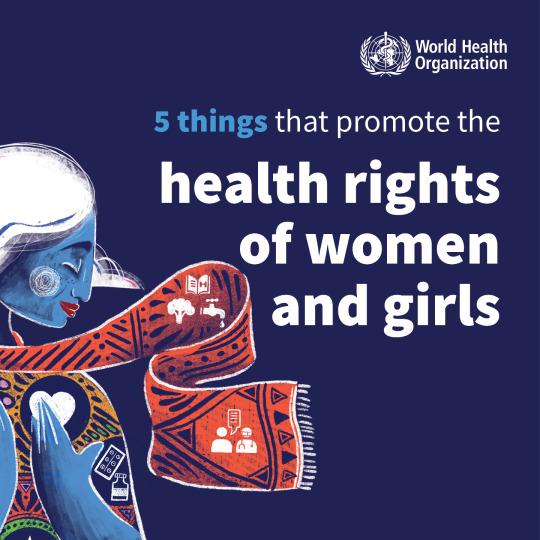
My health, my right advocates for ensuring universal access to quality health services, education and information as well as safe drinking water, clean air, good nutrition, quality housing, decent working and environmental conditions and freedom from discrimination.
The World Health Organization (WHO) contends that core challenges consistently compromising the right to health are political inaction, coupled with a lack of accountability and funding and compounded by intolerance, discrimination and stigma. Populations facing marginalisation or vulnerability suffer the most, such as people who live in poverty, are displaced, are older or live with disabilities, the UN health agency said.

Exacerbated by crises
While inaction and injustice are the major drivers of the global failure to deliver on the right to health, current crises are leading to especially egregious violations. The burning of fossil fuels is simultaneously driving the climate crisis and violating our right to breathe clean air.
“Everyone deserves access to quality, timely and appropriate health services, without being subjected to discrimination or financial hardship,” said WHO, launching the campaign.
“Yet, in 2021, 4.5 billion people, more than half of the world’s population, were not covered by essential health services, leaving them vulnerable to diseases and disasters.”

#right to health#worldhealthday#world health organization (who)#essential health services#campaign#access to quality essential services#access to appropriate health services#accelerate health impact#right to breathe clean air
0 notes